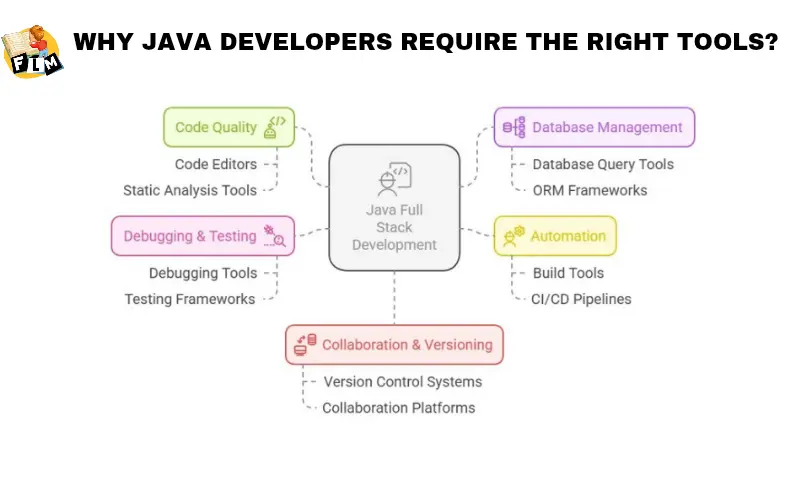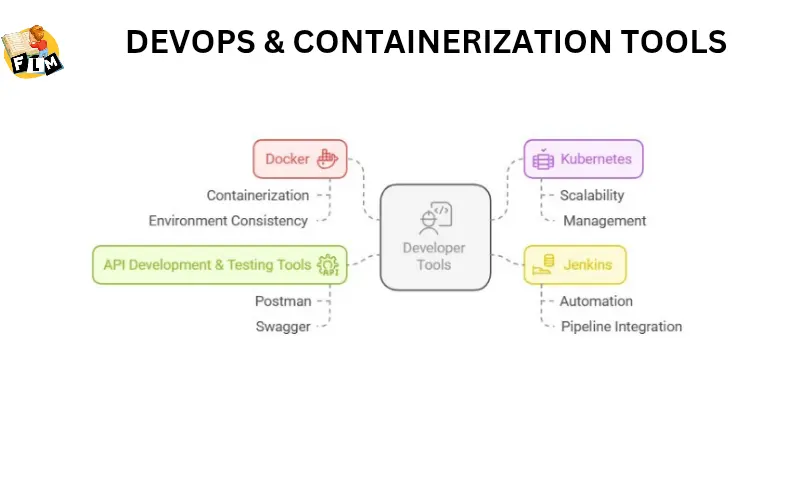Java Full Stack development is the most desirable skill among the current population of technologists. Developers need to master using numerous tools that make coding, debugging, testing, and deployment easier. The appropriate tools for Java developers can be a huge assistance when it comes to efficiency and workflow optimization. In this blog, we are going to discuss the tools which Java developers would require such as IDEs, frameworks, databases, testing tools, and version control systems
Why Java Developers Require the Right Tools?

Java Full Stack Developers perform front-end and back-end, and hence it is very crucial to learn different development tools. Proper tools for Java developers assist in
- Writing neat and effective code
- Working with databases the right way
- Build and deployment automation
- Efficient debugging and testing of applications
- Facilitating collaboration and versioning
Now, let us consider some of the essential tools that any Java developer would be familiar
Top IDEs for Java Development
An Integrated Development Environment or IDE is something that every Java developer must have. It is a rich development environment with test and debug facilities
Eclipse
Eclipse is a popular Java development environment with code completion, debugging, and rich pluginability. It is very customizable and can be applied to large-scale commercial software development
IntelliJ IDEA
Famous for its intelligent code completion and open framework integration, IntelliJ IDEA is a perfect tool for professional Java developers. Its smart suggestions and productivity features make development speed and ease to the maximum
NetBeans
NetBeans is a great option for starters as it has Java EE development support. It has a simple interface and possesses one of the best debugging tools
Build Automation Tools
Build automation saves time, and deployment is a piece of cake. Here are two build tools every Java developer would wish to have
Maven
Maven is used extensively for project and dependency management. Maven builds automatically and provides assurance that Java applications are compiled and deployed with certainty
Gradle
Gradle is a next-generation alternative to Maven with faster build times and more sophisticated dependency management. Gradle is greatly useful for Java projects at an enterprise level
Java Development Frameworks
Frameworks allow the developers to write robust applications with ease using reusable code and structure
Spring Boot
Spring Boot is an open-source system that simplifies some spring-based configurations to enable easier microservice development. Spring Boot shuns tedious configurations and allows for faster Java application development.
Hibernate
Hibernate is an Object-Relational Mapping software that provides access to databases through Java applications directly without using tedious SQL queries
JSF (JavaServer Faces)
JSF facilitates web application development using reusable UI components, and therefore front-end development becomes simpler
Version Control Systems
Version control systems allow Java developers to track code changes and collaborate efficiently
Git & GitHub
Git is the de facto version control system used, which allows developers to effectively track code changes and manage them. GitHub is a repository hosting service for the cloud and collaboration on projects.
GitLab & Bitbucket
GitLab and Bitbucket offer alternatives to GitHub with features like DevOps integration and automation of CI/CD
Java Full Stack Development Databases
Databases are necessary to store and process application data. The most fitting ones for a Java developer are as follows
MySQL
MySQL is a top-ranking relational database capable of supporting structured query language (SQL) data handling
PostgreSQL
PostgreSQL is very stable open-source database with big capacity to deal with complex transactions and queries
MongoDB
MongoDB is a NoSQL database that’s scalable and extensible, so the best suited for modern-day web applications
Java Developers Testing Tools
Testing is an essential part of software development as it ensures the application works as intended
JUnit
JUnit is a popular unit test library for Java applications. It automatically tests cases and enhances code quality
Selenium
Selenium is a browser test framework that facilitates browser automation testing, and hence suitable for Java full-stack developers who develop web applications
TestNG
TestNG is a high-level testing library that facilitates parallel testing and data-driven testing
DevOps & Containerization Tools

DevOps and containerization tools enable Java developers to deploy and run apps with high efficiency
Docker
Docker makes it easy for developers to containerize applications and provides consistency in the environment. Docker makes deployment and scaling easier
Kubernetes
Kubernetes is a container orchestration system that enables developers to handle many containerized applications effectively
Jenkins
Jenkins is a CI/CD tool that provides automatic software development pipelines, enabling faster delivery and deployment
API Development & Testing Tools
APIs are needed to merge applications and services. The below are the best API development and testing tools
Postman
Postman is a robust API test tool through which developers can send, test, and debug API requests
Swagger
Swagger is utilized to design, build, and document REST APIs so that backend and frontend teams can communicate easily.
Logging & Monitoring Tools
Logging and monitoring software enables developers to monitor application performance and identify issues in real time
Log4j
Log4j is one of the best logging frameworks through which developers are able to log and parse logs of an application
ELK Stack (Elasticsearch, Logstash, Kibana)
ELK Stack is an application for managing logs that is used to monitor and analyze Java applications in real-time
Front-End Technologies for Java Full Stack Development
Java Full Stack Developers must be familiar with front-end technologies to create interactive user interfaces
HTML, CSS, and JavaScript
These fundamental web technologies are needed to create responsive web applications
Angular & React
- Angular is a TypeScript framework for enterprise applications
- React is a JavaScript library for creating simpler UIs with reusable components
Conclusion
The secret to Java Full Stack Development success is having the right tools for Java developers. Be it frameworks and IDEs, databases and test tools, all these technologies make development, productivity, and code quality easier
If you’re planning a career as a Java Full Stack Development expert, make use of these best tools for a Java developer to keep succeeding in the world of technology.
Suggested Articles
- Real-World Applications of Java Full Stack
- Essential Soft Skills for Java Developers
- The Role of Mentorship in Java Development
Future-Proof Your Career with FLM’s AI-Powered Java Full Stack Development
Java Full Stack Developer Training
Learn Java, Spring Boot, React.js, SQL, and AI automation to build powerful web applications. AI is transforming software development, and companies need skilled Java full stack developers who can integrate AI-driven solutions. This 5+ month live, interactive training will help you master real-world projects, automation tools, and industry best practices
What You’ll Gain?
- High Demand – AI Skills Give You a Competitive Edge
- Earn ₹12 LPA+ with Java Full Stack & AI Expertise
- 100% Live, Expert-Led Training
- AI-Powered Development – Automate Coding & Debugging
- 7 Major & 7 Mini Real-World Projects for Hands-On Experience
- Mock Interviews, Resume Building & Career Guidance
- Exclusive: 2-Year Recording Access for the First 100 Enrollees
- Job-Ready Curriculum with Real-World Applications
Unlock your future with FLM’s AI-Powered Java Full Stack Development — limited seats remaining! – Enroll Now
visit: frontlinesedutech.com | Click Here to Enroll
WhatsApp: 8333077727

